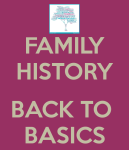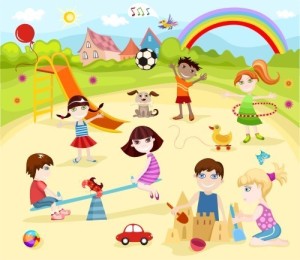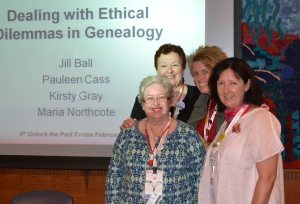Ethics and equity and the principles of justice do not change with the calendar.
(DH Lawrence) from http://www.brainyquote.com/
 Sometimes we need to be reminded that this genealogical passion of ours isn’t just about vacuuming up as many names, dates and data as we can track down, wherever we find them. We are also obligated to act responsibly, with respect for family (especially living family), ownership of information, and with accountability to those who share their expertise with us.
Sometimes we need to be reminded that this genealogical passion of ours isn’t just about vacuuming up as many names, dates and data as we can track down, wherever we find them. We are also obligated to act responsibly, with respect for family (especially living family), ownership of information, and with accountability to those who share their expertise with us.
With the upcoming AFFHO Congress in Canberra, all attendees need to become mindful and informed of ethical standards which should guide our family history research and how we disseminate it. Let’s get back to basics with these issues.
One of the earliest sessions I attended at FGS/RootsTech was one entitled The Ethical Genealogist, by highly regarded speaker Judy Russell – click to see an interview with her by James Tanner of Genealogy’s Star blog. (Although her session wasn’t video-taped, you can purchase the audio-recording here for $US10).
I’d never heard Judy speak before, though I follow the wisdom she shares on her blog, The Legal Genealogist. Only minutes into the presentation it was obvious that her excellent reputation was entirely deserved…she’s an engaging and informative speaker. Aussie genealogists who are planning on taking the 11th Unlock the Past Cruise from New Zealand to Australia will have the joy of hearing her present.
Anyway, back to my theme. Straight up Judy mentioned that it was okay to take photos for social media (at least that’s what I wrote down). Blind Freddy could work out that she didn’t mean take snaps of every single one of her slides and share the whole content. What’s happened subsequently, for her and other speakers, has caused something of firestorm which is pertinent to any conference we attend, whether wearing our genealogy hats or others.

Judy captured the essence of ethics in the playground rules we learnt in kindergarten:
- tell the truth
- play nice
- don’t tell tales.
I’m not going to elaborate on these here – I think they’re pretty self- evident though Judy’s nuanced discussion of them certainly wasn’t elementary. However, when in the 21st century, with the avalanche of interest in genealogy some of these golden rules seem to have been lost.
I’ve mentioned before in my blog posts, that we should always, always ASK for permission to use someone else’s content, research or images. We should always, always ACKNOWLEDGE the other person’s research (whatever form it takes). I’ve certainly had photos from my website siphoned off and attached to family trees, without either of these happening, despite the copyright notice across the photo.

Just recently, I also found a blog post I’d written (of which I was rather proud) for World Wide Genealogy, “happily” conjoined with a genea-product promotion on LinkedIn. I was NOT a happy camper because in my opinion it inferred that the post belonged to the product-owner. Carelessness or contrivance? Only weeks later the same thing happened with other genimates’ posts. Needless to say this was not a booth I visited in the Expo Hall at RootsTech – the product may be useful but I voted with my feet, and my wallet! Mind you, if the same person had been working I’d have been tempted to shame-job them by visiting.

It seems to me that too many of us are getting so absorbed with a belief in entitlement, with the justification that “I’m just sharing”, that we happily forget it’s not actually ours to share, and furthermore when we’ve signed up for programs we’ve specifically stated we will not abuse our membership in this way. These presentations, papers, slides, photos do NOT belong to us. After all if a person works making a chair, for example, we don’t think it’s okay to simply walk off with it and share it with our mates. Why? Because it’s the person’s income stream and also it’s THEFT. Ignorance may be bliss, but it’s no defence.
 Back in February 2015 on the 4th Unlock the Past cruise, Jill Ball aka GeniAus hosted an Ethics Panel which was very interesting. One of the questions was around photographing every slide in a presenter’s talk. The panel was universal in believing this was a breach of their copyright. We have regularly bemoaned that we didn’t tape this session.
Back in February 2015 on the 4th Unlock the Past cruise, Jill Ball aka GeniAus hosted an Ethics Panel which was very interesting. One of the questions was around photographing every slide in a presenter’s talk. The panel was universal in believing this was a breach of their copyright. We have regularly bemoaned that we didn’t tape this session.
There have been some excellent posts written post-RootsTech, which ought to be high on our compulsory reading list.
Credit and Copyright by Judy Russell
Copyright and the Genealogy Lecture by Judy Russell
More Genealogy Copyright Issues by Michael Leclerc on the Mocavo blog.
Genealogy’s Star: James Tanner regularly posts on similar issues, based on his legal experience.
You can read the AFFHO Ethics standards here.
For further reading you might want to look at the following sites referenced by Judy Russell as providing standards for genealogists:
Board for Certification of Genealogists– Standards
Association of Professional Genealogists – Ethics
Thanks Judy Russell for your knowledge, commitment and discernment in raising our performance standards as genealogists and family historians.
Thanks so very much for your kind words, Pauleen. Much appreciated. It’s an issue that needs more attention in the entire genealogical community.
LikeLiked by 1 person
I totally agree Judy and we all need to spread the word.
LikeLike
Very well said Pauline!
Yes, I have been frustrated by the lack of ethics and the theft of information or pictures.
My ancestry tree is now private for this reason. I feel that if people are really serious about their research then they will take the time to send me an email requesting information! I am happy to share but hate “theft”.
LikeLike
Thanks Sharon. I think when we find our hard work stolen we understand what it means. It’s why I don’t have my tree online anywhere – something I’m still reflecting on. I figure my nog serves much the same purpose.
LikeLike
Well said Pauleen, and while it has been said before, obviously people need reminders.
LikeLiked by 1 person
And again, and again, I suspect Alona.
LikeLike
Good post Pauline.
Only last night I found a photo of my Diwell family, of which I have the original, on Ancestry complete with the watermark WDFamiiies, but no one has asked if they can use it. It traces back to a private tree but has found its way on to public trees with no acknowledgement. I’ve found other snippits of my blog on Ancestry, again with no acknowledgement but I’m a bit annoyed about the photo. That’s actually the only photo I’ve watermarked on my blog simply as a deterrent to this happening because it is a treasured photo and I was in two minds about posting it in the first place. Obviously the Creative Commons link on my blog is not serving as the deterrent as I hoped it would.
Another photo I took of Mt Eccles in Victoria that has appeared on my blog has shown up on a dodgy Tourism website with no acknowledgement and no contact details to tell them off. I was alerted to that by a guy who also found his photo on the same site.
Lectures etc should not be treated any differently than going to see a band, comedian or theatre where you are asked to not to take photos or record. Still happens though. Saw a woman at a Ben 10 concert blatantly filming with her ipad. I was glad when security got on to her. (-:
LikeLike
Thanks Merron. You are absolutely right…I’ve seen similar infringements of live concerts and talks.
As to the theft of your photo….I feel your pain. Seriously it’s as if everything people see belongs to them and they can do what they want with it. Does my head in!! How do we turn this behaviour around? Does it only happen with genealogy or is it endemic?
LikeLike
Pauleen, I commend you for your excellent post concerning this. It is indeed a problem, and is absolutely inexcusable. People know better. They just know. Your post, as well as Judy Russell’s post are quite timely right now.
LikeLike
Thanks Peggy, I appreciate your support. I’m not sure that all people DO “get it” but by the same token they certainly SHOULD and educate themselves on this topic. It was good to meet you briefly at Myrt’s 🙂
LikeLike
Pauleen, I take snaps of slides in Evernote when speakers go so fast in the presentations that I cannot write my notes /thoughts on the topic down fast enough. I know we usually get hand outs but I like my notes along side the slides that generated they ideas. I hope that the speakers don’t think I am sharing the presentation. I never even though that’s what they might be thinking.
I totally agree about it being stealing. I had so many of my I images for my (real paid) work stolen when the Internet was much newer by companies selling products. It was hard work doing the photos to have them used on other sites. Fran
LikeLike
Fran, the speakers would have no way of knowing that you aren’t going to share your photos of the slides, or use the content. If you ask in advance they may say yes; I usually do.
LikeLike
Great idea Carol. When I think about it I have asked in the past. Speakers that say what you can share if they are giving out links are great too. Fran
LikeLiked by 1 person
Fran, I can see what you’re saying – I went to one talk where the slides changed too quickly and had to make do with my notes + syllabus. The post I linked to by Michael Leclerc explains why even taking them for personal consumption is inappropriate. In some presentations people were specifically prohibited from taking photos yet I saw the room monitor having to go up and remind them. I’m quite sure you didn’t intend to breach copyright but unfortunately the more photos taken, the more people will take them.
LikeLike
A very important topic – thanks, Pauleen. It’s always good to be reminded of the ethics of genealogy (Genethics?).
I’d have been tempted to have my say at that stall, politely, but in a carrying voice, but then you’re probably a nicer person than me 😉
LikeLike
Nah, not a nicer person, but since it wasn’t the specific culprit I couldn’t be bothered spoiling my day.
LikeLiked by 1 person
Pauleen, I’ve just read an article which may be useful to us all. It’s not about genealogy, but the same principles apply. It’s written from a US perspective, but relevant worldwide.
http://www.thebookdesigner.com/2015/02/a-step-by-step-guide-to-dealing-with-content-theft/
LikeLike
Thanks Frances…very helpful. Would you mind if I refer to it on the Geneabloggers’ site and mention it came via you? It is focused on the US and from my feeble understanding our legislation is different, including not having to register copyright.
LikeLike
Of course, please do. Law’s different in every country, but it’s still a useful guide, I think.
LikeLiked by 1 person
Pauleen,
I want to let you know that your blog post is listed in today’s Fab Finds post at http://janasgenealogyandfamilyhistory.blogspot.com/2015/02/follow-friday-fab-finds-for-february-27.html
Have a great weekend!
LikeLike
Thanks so much Jana.
LikeLike
Couldn’t agree more.
LikeLike
thanks Kristin.
LikeLike